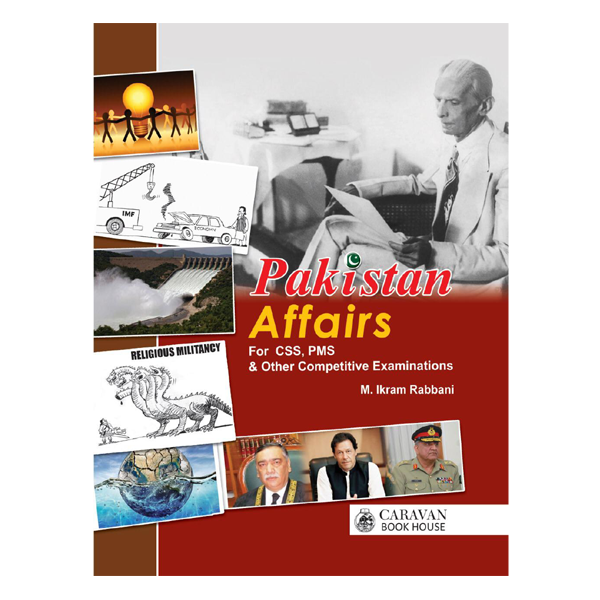Pakistan Affairs By Ikram Rabbini (Carvan Publication )
Best For Competitive Exams (CSS,PMS,PCS & All Descriptive Exams)
PREFACE TO THE SECOND EDITION
This book is a comprehensive study of Pakistan affairs, covering all the topics that are relevant to the Federal Public Service Commission (FPSC) exams. It is based on extensive research and includes all the latest developments in the country. This book has been meticulously crafted to cater to the needs of aspirants preparing for the prestigious Federal Public Service Commission (FPSC) examinations, including the Central Superior Services (CSS), Provincial Management Service (PMS), and Judiciary exams. Our aim is to provide a comprehensive and up-to-date resource that encompasses the vast spectrum of Pakistan's history, from its pre-partition origins to its post-partition evolution, while also delving into the latest developments and issues that shape the nation today.
In line with the rigorous demands of the FPSC syllabus, this book offers a well-researched compilation of historical narratives, political dynamics, socio-economic insights, and contemporary analyses. It serves as both a foundational text for those new to the subject and as a valuable reference for those seeking a deeper understanding of Pakistan's complex journey.
The creation of this book has been a collaborative effort, and we extend our heartfelt gratitude to our colleagues, friends, and family whose unwavering support and encouragement kept us motivated throughout this endeavor. Their insights and discussions enriched the content and ensured its accuracy.
We also wish to express our appreciation to the scholars and authors whose works have been cited in this book. Their contributions have been pivotal in shaping our understanding of Pakistan's history, politics, economics, and society. Proper attribution is a cornerstone of academic integrity, and we have strived to uphold this principle by crediting their invaluable contributions.
One of the primary objectives of "Pakistan Affairs" is to aid aspirants of Civil Service Exams in their quest for success. The book provides a roadmap for tackling the intricate web of topics that encompass Pakistan's historical legacy, its ideological foundations, its constitutional evolution, its foreign policy dynamics, and its contemporary challenges. By combining historical insights with present-day analyses, we aim to equip aspirants with the tools to analyze and respond effectively to the multifaceted questions posed in these competitive examinations.
Within these pages, readers will find a comprehensive exploration of Pakistan's pre-partition history, including the factors leading to the creation of the nation. The text delves into the ideological debates that have shaped Pakistan's identity and the subsequent governance models. The post-partition era is dissected to reveal the evolving socio-political landscape, economic challenges, and foreign policy considerations that continue to shape Pakistan's trajectory.
In conclusion, "Pakistan Affairs: A Comprehensive Guide for Civil Service Exams" is more than a textbook; it is a journey through the annals of Pakistan's history and its contemporary complexities. We sincerely hope that this book serves as a valuable companion to aspirants, aiding them in their pursuit of excellence and in their endeavor to contribute meaningfully to the nation's future.
Prof. M. Ikram Rabbani
Muhammad Arslan Chaudhry (PAS/DMG)
Authors
CONTENTS
1-PAKISTAN IDEOLOGY
Ø AIMS AND OBJECTS OF THE ESTABLISHMENT OF PAKISTAN
· What is Ideology? How Ideology Emerges?
· Importance of an Ideology, Basis of Pakistan Ideology:
PAKISTAN IDEOLOGY.
· Definition and Explanation, Two-Nation Concept.
· Aims and Objects of the Establishment of Pakistan; Enforcement of the Sovereignty of the God Almighty
· Establishment of Islamic Democracy, Revival of Muslims' Image and Identity; Protection of Muslim Culture and Civilization...
· Two-Nation Theory, Emancipation from the Prejudicial Hindu Majority, Establishment of a Balanced Economic System
Ø PAKISTAN IDEOLOGY AND ALLAMA IQBAL
Ø PAKISTAN IDEOLOGY AND THE QUAID-I-AZAM
2-HISTORICAL PERSPECTIVE OF IDEOLOGY OF PAKISTAN
Ø RELIGIOUS AND REFORMATIVE MOVEMENTS, THE EVOLUTION OF MUSLIM NATIONALISM IN INDIA
· The Advent of Islam in the Sub-Continent
Ø SINDH-THE 'BAB-UL-ISLAM'
· Muhammad Bin Qasim Attacks India.
· Spread of Islam in other Parts of India.
Ø THE IMPACT OF ISLAM
· Islam and Hinduism, Cultural Influence
· Religious Influence
Ø DOWNFALL OF MUGHAL EMPIRE.
Ø CAUSES OF WAR OF INDEPENDENCE
Ø HINDU REACTION
· Hindu Nationalist Movements
· Bhagti Movement, Din-e-Elahi
Ø IMAM RABBANI HAZRAT MAJADID ALF SANI
· Social Conditions of India
· Sheikh Ahmad's Efforts to Purge Muslim Society of Atheist Values, Sheikh Ahmad's Letters
· Sheikh Ahmad Imprisoned Sheikh Ahmad and Two-Nation Concept......
· Wahdat-ul-Wajud and Wahdat-ul-Shahud
· The Influence of Sheikh Ahmad's Efforts, Hazrat Shah Wali Ullah Muhadis Dehlvi.
· Social Conditions of India in Shah Wali Ullah's Time
Ø SHAH WALI ULLAH'S MOVEMENT
· Religious Reformation, Political Services
· Works of Shah Wali Ullah
· Syed Ahmed Shaheed Brailvi
· Preparation for Jehad Against Sikhs..
· Declaration of War, Enforcement of Shariat
Ø FRAIZI MOVEMENT
· Dudu Miyan
· Titumir
Ø EDUCATIONAL MOVEMENTS..
Ø ALI GARH MOVEMENT SIR SYED AHMED KHAN
Ø THE BEGINNING OF ALIGARH MOVEMENT
· The Educational Aspect of the Aligarh Movement.
· Establishment of Muhammadan Anglo-Oriental College at Ali Garh.
· Muhammadan Educational Conference, Political Aspect of Ali Garh Movement
· Steps for Creating Better Understanding Between the Muslims and the British
· Religious Services of the Aligarh Movement, Social Services of the Aligarh Movement.
Ø PIONEER OF TWO-NATION THEORY
· The Impact of Aligarh Movement, Aligarh Movement after the Death of Sir Syed Ahmad Khan
Ø TEHRIK-I-DEOBAND
· Dar-ul-Uloom-i-Deoband, Founders of Deoband.
· Activities of Dar-ul-Uloom.
· Teachers/Students of Dar-ul-Uloom, Political Trends of Deoband.
· Educational Aspect of the Deoband, Dar-ul-Uloom-Deoband and Aligarh.
· Nadva-tul-Ulema of Luckhnow
· Establishment of Nadva-Tul-Ulema, Objectives of Nadva, Nadva-tul-Ulema and Maulana Shibli
Ø ANJUMAN-I-HIMAYAAT-I-ISLAM, LAHORE
· Objectives of Anjuman, Educational Services,
· Political Services of the Anjuman-i-Himayat-i-Islam
Chapter 1
PAKISTAN IDEOLOGY
AIMS AND OBJECTS OF
THE ESTABLISHMENT OF PAKISTAN
WHAT IS AN IDEOLOGY?
The term Ideology is a complex phenomena in the study of Social Sciences on which a great deal of controversy exists among scholars on its meanings and definition. The French Philosopher Autoine Destull de Tracy used the word ideologie during French Revolution and defined it as the Science of Ideas meaning thereby as the study of the origins, evolution and nature of ideas. To Karl Marx ideology means the ideas of the ruling Junta who seeks to perpetuate the prevailing order of Capitalism and their own privileged position. Karl Manneheim, to some extent took a similar view of ideology by defining it as the conservative, self-seeking and biased views of the dominant class in society.
In view of the different approaches towards the meaning of an ideology, a working definition can, however, be evolved to reach at a conclusion. Ideology is a different form of those comprehensive patterns of moral beliefs about man, society and the universe in relation to man and society. Ideology is often understood as a way of thinking about the cultural and social programme of a political movement launched to emancipate a suppressed group from the exploitation of a more dominant social class. The (ideologies) deal with idea or abstract speculations and are a systematic set of arguments and beliefs used to justify an existing or desired social order. "A political ideology is a system of beliefs that explain and justifies a preferred political order, either existing or proposed and offers strategy (institutions, processes programmes) for its attainment”.
The ideologies contain a set of proposals about human nature and society. These proposals explicitly manifest human conditions, approaches and understanding of a social and political order and provide a basis for the accomplishment of a desired social system. "An ideology offers an interpretation of the past, and an explanation of the present and a vision of the future."
HOW IDEOLOGY EMERGES?
Ideologies often reflect the way of thinking of a nation or a social group who has been rejected a social position which otherwise would have been its due place in the society. It grows amongst the dissatisfied and disgruntled group of society as a challenge to the prevailing social set up. The ideologies are propagated as a systematic programme logical ideas, which convincingly explain the human destinies. The ideologies are highly integrated around one or few pre-eminent values, such as salvation, equality or ethnic purity. They lay emphasis on their form, distinctiveness and never intend to follow outlooks, creeds and other ideologies existing in the same society.
Ideologies tend to arise in times of crisis and social stress. They originate and get support among those sections of society who have rejected the prevailing conditions. "An ideology emerges when people feel strongly that they are being mistreated under an existing order, when their status is threatened by fundamental changes occurring in the society, and when the prevailing ideology no longer satisfies them”. This state of affair drives the ignored and maltreated groups towards other ideologies, which show them a new horizon of better life.

